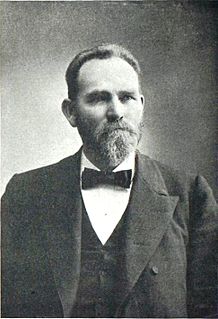A Quote by Samuel Johnson
But though it cannot be reasonable not to gain happiness for fear of losing it, yet it must be confessed, that in proportion to the pleasure of possession, will be for some time our sorrow for the loss.
Related Quotes
We mourn; we sorrow for our loved ones that go - our wives, our husbands, our children, our parents; we sorrow for them; and it is well and proper that we should moum for them and shed tears for the loss, for it is our loss; but it is their gain, for it is in the march of progress, advancement and development. It will be all right when our time comes, when we have finished our work and accomplished what the Lord required of us.
The difference between shallow happiness and a deep, sustaining joy is sorrow. Happiness lives where sorrow is not. When sorrow arrives, happiness dies. It can't stand pain. Joy, on the other hand, rises from sorrow and therefore can withstand all grief. Joy, by the grace of God, is the transfiguration of suffering into endurance, and of endurance into character, and of character into hope--and the hope that has become our joy does not (as happiness must for those who depend up on it) disappoint us.
It is abundantly evident that, however natural it may be for us to feel sorrow at the death of our relatives, that sorrow is an error and an evil, and we ought to overcome it. There is no need to sorrow for them, for they have passed into a far wider and happier life. If we sorrow for our own fancied separation from them, we are in the first place weeping over an illusion, for in truth they are not separated from us; and secondly, we are acting selfishly, because we are thinking more of our own apparent loss than of their great and real gain.
Happiness is impossible, and even inconceivable, to a mind without scope and without pause, a mind driven by craving, pleasure, or fear. To be happy, you must be reasonable, or you must be tamed. You must have taken the measure of your powers, tasted the fruits of your passion, and learned your place in the world and what things in it can really serve you. To be happy, you must be wise.
What is required is the finding of that Immovable Point within one's self, which is not shaken by any of those tempests which the Buddhists call 'the eight karmic winds': 1-fear of pain, 2-desire for pleasure; 3-fear of loss; 4-desire for gain; 5-fear of blame, 6-desire for praise; 7-fear of disgrace; [and] 8-desire for fame.
You gain strength, courage, and confidence by every experience in which you really stop to look fear in the face.... The danger lies in refusing to face the fear, in not daring to come to grips with it. If you fail anywhere along the line it will take away your confidence. You must make yourself succeed every time. You must do the thing you think you cannot do.
Joy, anger, sorrow, happiness, find no place in that man's breast; for to him all creation is ONE. And all things being thus united in ONE, his body and limbs are but as dust of the earth, and life and death, beginning, and end, are but as night and day, and cannot destroy his peace. How much less such trifles as gain or loss, misfortune or good fortune?
I think the Democrats are going to have to be willing to give up, maybe, some short-term political gain by whipping up fears on some of these things - if it's a reasonable Social Security proposal, a reasonable Medicare proposal. We've got to deal with these things. You cannot have health care devour the economy.
Sometimes we must undergo hardships, breakups, and narcissistic wounds, which shatter the flattering image that we had of ourselves, in order to discover two truths: that we are not who we thought we were; and that the loss of a cherished pleasure is not necessarily the loss of true happiness and well-being.






































